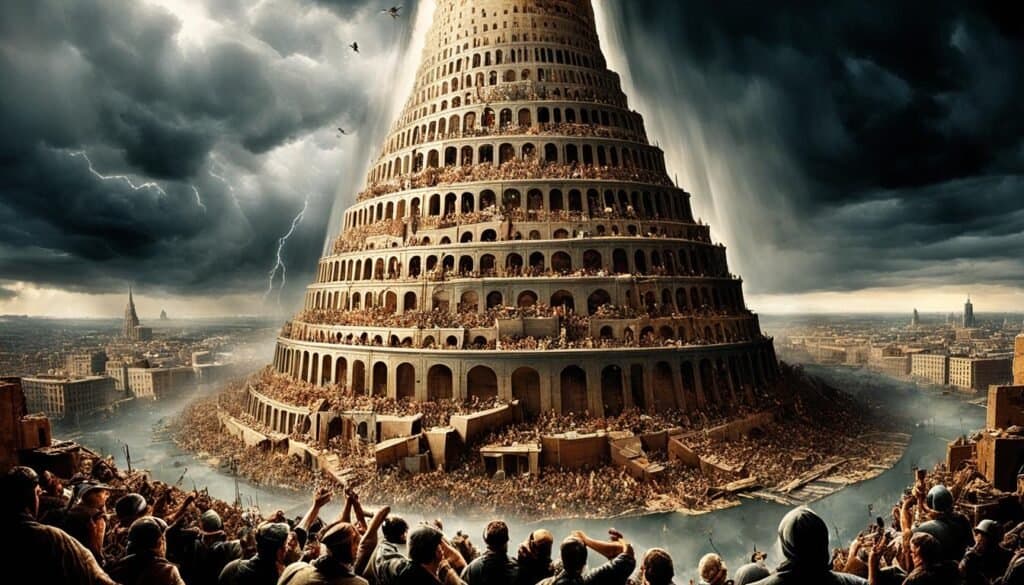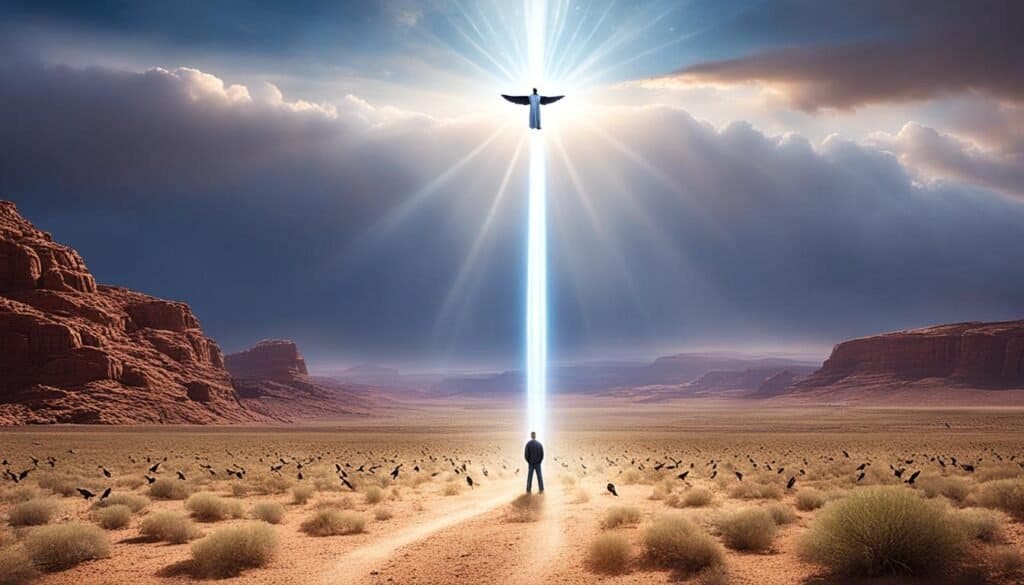Have you ever wondered about God’s foreknowledge and control in Genesis? These ten stories show us how God knows all and is in charge. We will see how God’s actions guide creation, the Fall, and our redemption.
Key Takeaways:
- God’s sovereignty over existence is showcased through His act of creation ex nihilo.
- The Garden of Eden reflects God’s meticulous foreknowledge of humanity’s needs and desires.
- The Fall of Man unfolds within the context of God’s overarching plan for redemption.
- God’s foreknowledge of Cain and Abel’s hearts is evident in their contrasting offerings.
- The Flood demonstrates God’s sovereign choice and preservation of Noah’s lineage.
Creation Ex Nihilo: God’s Sovereign Act of Creation
In the book of Genesis, from the first verse, we see God creating everything. He makes the heavens and the earth from nothing. This shows God’s absolute control over all that exists.
“In the beginning, God created the heavens and the earth.” – Genesis 1:1
Genesis shows God as the beginning of everything. It shows He is in charge of the whole universe. The phrase “creation ex nihilo” means creating out of nothing. It highlights God’s power to make life and order from nothing.
By making the heavens and the earth, God shows His rule over all. He uses His will to form the world as He wants. Every little detail and every natural event show His wisdom and plan.
Creation ex nihilo highlights that God is the starting point of all life. He is not limited by what already exists or by any outside force. Instead, He creates life and beauty through His own strength.
This act shows that God is the highest power over all. He can decide the limits, set the laws of nature, and choose what happens to everything. Nothing can be outside of His control.
Thinking about creation ex nihilo reminds us we need God. He is the reason we are alive, and we only exist because of His plan. Knowing He is in charge makes us humble and full of wonder. It encourages us to believe in His wisdom and intentions.
Creation Ex Nihilo: A Table Showcasing God’s Sovereign Act of Creation
| Creation Ex Nihilo | God’s sovereignty over existence | |
|---|---|---|
| Definition | Creation out of nothing | God’s complete control over all things |
| Implication | God is the ultimate source of all existence | God has authority over everything that exists |
| Significance | Highlights God’s power and purpose | Emphasizes His sovereignty and authority |
| Impact | Invites reflection on our dependence on God | Inspires humility, trust, and awe |
The Garden of Eden: God’s Meticulous Foreknowledge
In the Garden of Eden, God’s foresight and planning shine bright. He creates a perfect home for humanity to flourish. God knows their needs and wants even before they do.
God puts the tree of knowledge of good and evil at the garden’s center. This shows He knows humans might disobey. By allowing them to choose, they can learn and grow.
“And the Lord God commanded the man, saying, ‘Of every tree of the garden you may freely eat; but of the tree of the knowledge of good and evil you shall not eat, for in the day that you eat of it you shall surely die.'” – Genesis 2:16-17
Placing the tree near Adam and Eve shows God truly knows them. He hopes they’ll obey but respects their free will. This choice is crucial for their growth.
The tree highlights God’s all-knowing nature and understanding of us. God wants humans to choose and learn from their decisions. His care for our choices starts in the Garden of Eden.

Effects of the Tree
The tree of knowledge changes everything for Adam and Eve. They learn about good and evil but lose their innocence. It’s a moment that defines human history.
| Effect | Description |
|---|---|
| Loss of Innocence | They realize they’re naked and feel shame for the first time. |
| Expulsion from Eden | God sends them out of Eden after they disobey, cutting off close contact. |
| Introduction of Sin | Their disobedience brings sin into the world, changing everything. |
The Eden story highlights God’s deep understanding of us. It shows that even when we make mistakes, God’s plan includes chances for us to be saved and made new.
The Fall of Man: Unfolding Within God’s Plan
When we look at Adam and Eve’s story, we see God’s complex balance. He allowed free will, yet had a plan for redemption. The Fall of Man, caused by their disobedience, seems like a wrong turn. But really, it fits into God’s big plan to save us all.
Adam and Eve could freely choose, even if God knew they might fall to temptation. This freedom from God let them live fully, including making mistakes.
God wasn’t caught off guard by their choice. He saw it all coming and already had a way to fix things. This misstep by Adam and Eve brought the need for a Savior and showed the hope of salvation.
“For God so loved the world, that he gave his only Son, that whoever believes in him should not perish but have eternal life.” – John 3:16
This plan included sending Jesus Christ to beat sin and bring us back to God. So, the Fall, while sad, was a necessary turning point. It fulfilled God’s goal and brought us back to Him.
After the Fall, humans knew they needed saving. This made them want to be close to God again. Sin’s results, like death, made Jesus’s sacrifice and resurrection give us a chance at eternal life.
So, the Fall was a sad but key part of God’s way to save us. It shows how much He loves us and His power to set things right.
The Consequences of the Fall
| Consequence | Explanation |
|---|---|
| Spiritual Separation from God | The Fall broke direct connection to God, calling for Christ to bridge the gap. |
| Physical Death | It brought about mortality, showing life’s being not forever. |
| Pain and Suffering | Because of sin, we face pain in body, mind, and spirit. |
| Broken Relationships | Disorder in relationships with both God and people started with the Fall. |
| Disrupted Creation | The Fall affected not just us but the whole world, bringing in chaos and fault. |
| The Need for Redemption | The Fall made clear our sin and need for a Savior to fix our connection with God. |
Cain and Abel: God’s Foreknowledge of Hearts
In the story of Cain and Abel, God shows He knows their hearts. These brothers, children of Adam and Eve, make different offerings to God. This shows what’s really in their hearts.
Abel, a shepherd, brings his best sheep to God. This shows his faith and follows God’s rules. God sees Abel’s pure heart and accepts his gift.
Then, Cain gives fruit from the ground, not showing true respect. God sees Cain’s insincere heart and doesn’t favor his gift like Abel’s.
God ignores Cain’s gift and chooses Abel’s because of their hearts. This choice leads to Cain killing Abel out of jealousy and anger.
This shows God understands people’s true motives. It’s proof of His deep insight into our hearts. He knew Cain’s heart and what would happen.
“But the Lord said to Cain, ‘Why are you furious? Why do you look sad? If you do well, you will be happy. But if not, sin is waiting to get you. You must overcome it.'” (Genesis 4:6-7)
– The Book of Genesis
Consequences Revealed
Cain’s story shows the consequences of sin and God’s deep knowledge of our hearts. Even though Cain tries to hide his sin, God knows all:
“The Lord said, ‘What have you done? Your brother’s blood cries to me from the ground.'” (Genesis 4:10)
– The Book of Genesis
This reminds us that God’s justice will always be realized. His plans for the world go on, despite our choices and actions.
Thinking about Cain and Abel reminds us of God’s limitless knowledge. He looks at our hearts, not just what we do. God’s rule shows in ways we don’t always see at first.
Throughout Genesis, we see God’s knowing and control over history. This is all part of His plan to save us.
The Flood: Sovereign Choice and Preservation
The Flood in Genesis shows God’s powerful choice and protection. God chose to save Noah’s family, highlighting His control over life and death.
Seeing the world becoming more evil, God sought a new beginning. He found Noah to be righteous and chose him to start over.
Noah was tasked with building an ark. Despite mockery, he faithfully followed God’s plan. This obedience spared his family from the flood’s destruction.
The selection of Noah was not random but part of God’s plan. By saving Noah, God ensured that future promises, like salvation, would be kept.
“Noah did everything just as God commanded him.” – Genesis 6:22
The Flood reveals God’s power over history. It demonstrates His fairness in judging the wicked and protecting the good.
This event also highlights God’s promise in redemption. It shows His consistency in justice, mercy, and love for His people.

| Key Points | Scripture References |
|---|---|
| God’s sovereign choice to save Noah and his family | Genesis 6:8-9 |
| Noah’s obedience and unwavering faith | Genesis 6:22, Hebrews 11:7 |
| God’s control over the course of history | Genesis 7-8, Proverbs 21:30 |
| The theological implications of the Flood | Genesis 9:11, Ephesians 2:8-9 |
In summary, the Flood story highlights God’s choices and care. It shows His plan and his dedication to redemption. Reflecting on this event reveals crucial aspects of God’s nature and strengthens our faith in His control.
The Tower of Babel: God’s Intervention and Control

The people tried to build a tower to the sky. But God stopped them by scattering them around the world. He also made them speak different languages. This shows that God is in control of our ambitions and the path of history.
In Genesis 11:4, everyone worked together to build a tower. Their goal was to reach the heavens. But God saw their power and decided to stop them. He said, “If they can do this together, nothing will be impossible for them.” So, God mixed up their languages, stopping their work and scattering them.
“Come, let us go down and confuse their language so they will not understand each other.” – Genesis 11:7
By mixing up their languages, God created a barrier that forced them apart. This separation was a way to control their unrestrained ambitions.
The story of the Tower of Babel teaches us that God knows when we are too ambitious. Even when we work together, He can intervene. God’s intervention shows His true power. It reminds us that we should follow His plans.
The Tower of Babel and Lessons Learned
The Tower of Babel teaches us many things. It shows how important it is to be humble. We should make sure our plans match what God wants, not what we want. It also teaches us that working and speaking together is key. It warns us about the problems that come with not understanding each other.
Additionally, it is a story about our limits and God’s role in guiding us. It reminds us to trust in God more than in ourselves. We must remember that God’s plans are above ours.
The Tower of Babel warns us that God is always in charge. Even when we have big dreams, they must be in line with God’s will. This way, His guidance protects us from the harm of our own pride.
| Key Lessons from the Tower of Babel |
|---|
| 1. Humility in the face of divine authority |
| 2. The importance of effective communication and unity |
| 3. The limitations of human power and the need for divine guidance |
| 4. Trusting in God’s sovereignty rather than our own abilities |
Abraham’s Call: Deliberate Plan for Salvation
God picked Abraham to start a special line of people. This chose family would play a key role in saving humanity. By trusting and obeying God, Abraham’s actions set a strong base for everyone’s future chance at redemption.
When God called Abraham, it was a turning point in His big plan. Leaving his homeland, Abraham was promised many blessings. He was to become a great nation, and everyone on earth would be blessed through him (Genesis 12:1-3). This made Abraham and his descendants stand out, giving them a special purpose from God.
“Now the LORD said to Abram, ‘Go from your country and your kindred and your father’s house to the land that I will show you. And I will make of you a great nation, and I will bless you and make your name great, so that you will be a blessing. I will bless those who bless you, and him who dishonors you I will curse, and in you all the families of the earth shall be blessed.'” – Genesis 12:1-3
Abraham showed incredible faith when God called him. He left his home without knowing where he was going. Despite challenges, his devotion to God remained strong. This faith and obedience are remembered and admired by many even today.
Later, God asked Abraham to sacrifice his son Isaac. This was a tough test of faith. Despite the difficulty, Abraham trusted God completely. Just as he was about to carry out the sacrifice, God stepped in. He provided a ram for the offering instead, showing He would keep His promises to Abraham.
This story hints at another, greater sacrifice to come. Jesus, God’s own Son, would later die for the salvation of the world. Abraham’s unwavering trust in God’s plan and his actions are seen as paving the way for this ultimate act of love.
The Covenant with Abraham
God made a special agreement with Abraham, showing His clear plan for saving humanity. This covenant, or promise, was a cornerstone for the people of that time. It pledged not just many descendants, but also a specific land for them to live in.
| Blessings | Conditions |
|---|---|
| Great nation | Leave his country and family |
| Become a blessing | Go to the land God will show |
| Bless those who bless him | Obey God’s commands |
| Curse those who dishonor him | Offer Isaac as a sacrifice |
| All families of the earth blessed through him | Have faith in God’s promises |
Abraham’s calling was just the start of a journey. It was the first step in a plan for salvation that would later be completed through Jesus, a descendant of Abraham.

Isaac’s Sacrifice: Testing Faith and Foreshadowing
The story of Isaac’s sacrifice shows us a deep test of faith. God asks Abraham to offer his dear son, Isaac, as a sacrifice. This command really tests how much Abraham trusts God. He’s told to give up his son, who was the promise God made for a great nation. In this tough moment, Abraham shows he will follow God’s orders completely.
Abraham and Isaac’s trip to Mount Moriah is solemn. As they go up, Isaac carries the wood, not knowing what will happen. Feeling very heavy, Isaac asks his father about the sacrifice. Abraham wisely replies, “God will provide the lamb, my son”
Before the sacrifice, God stops it. He provides a ram for the sacrifice instead, caught in a bush. This event not only saves Isaac but also hints at Jesus’ future sacrifice.
“For God so loved the world, that he gave His only Son, that whoever believes in Him should not perish but have eternal life.” – John 3:16
Isaac’s sacrifice speaks to Abraham’s strong faith and God’s provision. It highlights Abraham’s trust in God, despite the huge challenge. Importantly, it hints at how Jesus would later sacrifice Himself to save humanity.
| Key Elements | Significance |
|---|---|
| God’s command to sacrifice Isaac | Test of Abraham’s faith and obedience |
| Abraham’s unwavering trust in God | Demonstrates the depth of his faith |
| The provision of a ram as a substitute | Divine intervention and foreshadowing of Jesus Christ’s sacrifice |
| Symbolic significance | Points to God’s plan of redemption through the sacrifice of His own Son |
Jacob and Esau: God’s Sovereign Choice
In the story of Jacob and Esau, God shows He’s in complete control. He decided, before their birth, who would carry the covenant promises. This emphasizes God’s complete authority and divine plan.
Despite human ways and thinks, God selected Jacob over Esau. This breaks the norm of the firstborn being the chosen one. God has his own standards, above human customs.
Choosing Jacob represents God’s deep wisdom. It shows His purposeful and meaningful choices. His plan is deeply thought out and serves a greater good.
God showed that He can use any situation to fulfill His plans. He works through people’s flaws, achieving His goals with strategic moves. This highlights His all-knowing nature.
A Tale of Two Brothers
“The Lord said to her, ‘Two nations are in your womb, and two peoples from within you will be separated; one people will be stronger than the other, and the older will serve the younger.'” – Genesis 25:23 (NIV)
God’s plan includes both His direct choices and people’s actions. The tale of Jacob and Esau underlines how God’s grand design is played out on Earth. It shows the paths of selfishness and God’s grace.
God’s selection of Jacob marks His deep wisdom. The choice of the younger over the older brother shows God’s unconventional ways. This leads to Jacob becoming the forefather of Israel, a significant step in God’s plan.
Reflecting on Jacob and Esau reminds us of God’s sovereignty. Just as He guided these brothers, He’s leading our lives too. We can find comfort in His perfect direction for us, just like He did with Jacob and his family.
How Does the Fall of Jericho Demonstrate Divine Foreknowledge and Sovereign Control Similar to the Events in Genesis?
The fall of Jericho reveals God’s divine foreknowledge and sovereign control, much like pivotal moments in Genesis. The miracle of jericho in bible showcases how God orchestrates events beyond human understanding, guiding his chosen people with precision—a theme mirrored in Genesis through stories like the Flood and Abraham’s calling.
Joseph and His Brothers: God’s Control and Redemption
Joseph’s story is incredible. His brothers sold him into slavery, but he became Egypt’s vizier. It shows how God guides even the worst situations. Joseph learned to trust in God’s plan, and this faith led to his and his family’s redemption. The Israelites were also saved because of this.
Joseph faced many challenges after his brothers betrayed him. Despite this, God was with him, using every hardship for a greater good. Even during his time in prison, Joseph’s skill at interpreting dreams impressed Pharaoh. This favor was from God, setting in motion events that would change everything.
In the end, Joseph reveals himself to his brothers. This act of forgiveness and reconciliation shows the power of redemption. God’s plan included saving not just Joseph but his whole family from famine. This event also paved the way for God to fulfill his promises to Abraham’s descendants. Joseph’s story points to a future redemption brought about by the Messiah from the line of Abraham.
Affiliate Disclosure: "As an Amazon Associate I earn from qualifying purchases made from links in this post. We are a participant in the Amazon Services LLC Associates Program, an affiliate advertising program designed to provide a means for us to earn fees by linking to Amazon.com."

